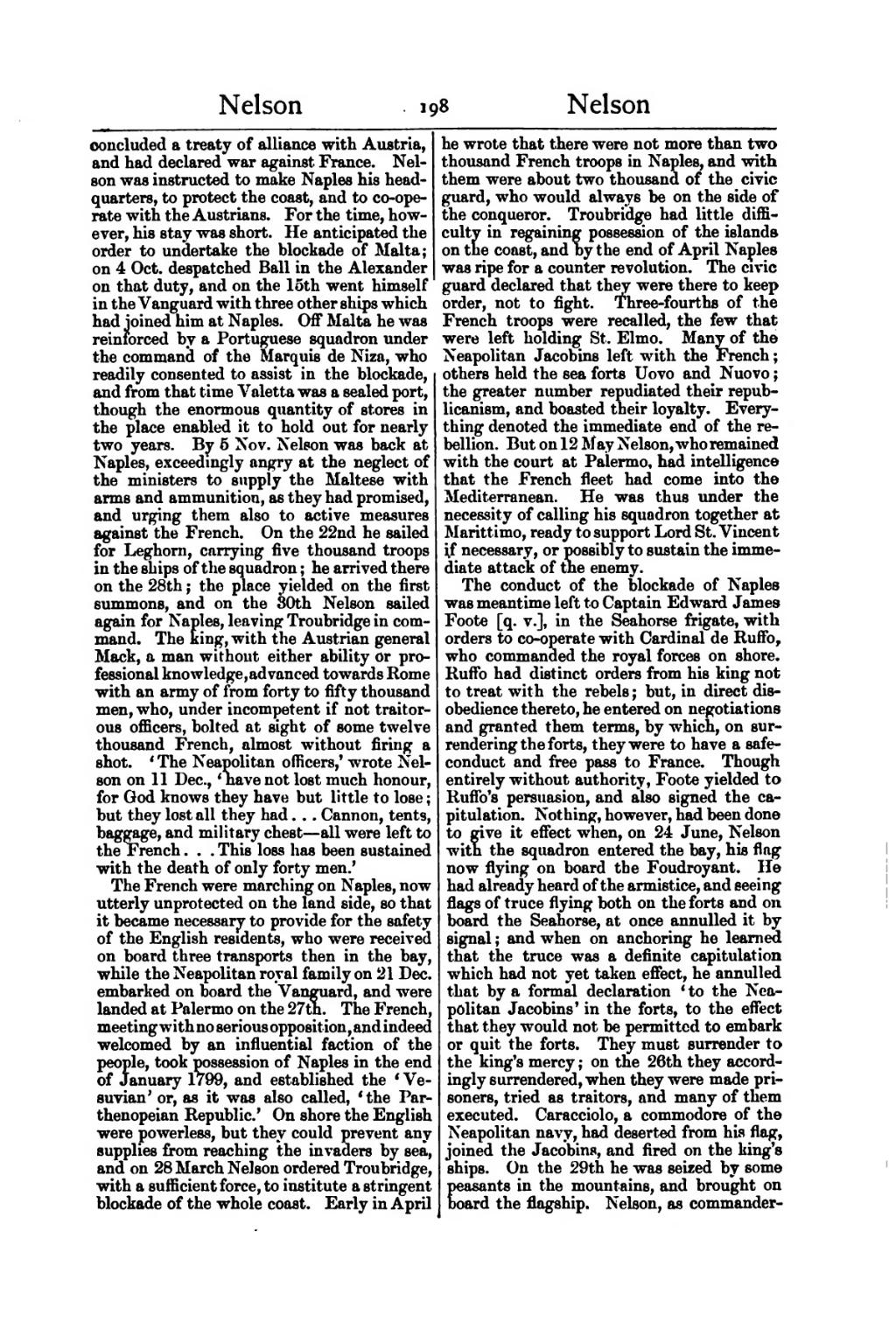concluded a treaty of alliance with Austria, and had declared war against France. Nelson was instructed to make Naples his headquarters, to protect the coast, and to co-operate with the Austrians. For the time, however, his stay was short. He anticipated the order to undertake the blockade of Malta; on 4 Oct. despatched Ball in the Alexander on that duty, and on the 15th went himself in the Vanguard with three other ships which had joined him at Naples. Off Malta he was reinforced by a Portuguese squadron under the command of the Marquis de Niza, who readily consented to assist in the blockade, and from that time Valetta was a sealed port, though the enormous quantity of stores in the place enabled it to hold out for nearly two years. By 5 Nov. Nelson was back at Naples, exceedingly angry at the neglect of the ministers to supply the Maltese with arms and ammunition, as they had promised, and urging them also to active measures against the French. On the 22nd he sailed for Leghorn, carrying five thousand troops in the ships of the squadron; he arrived there on the 28th; the place yielded on the first summons, and on the 30th Nelson sailed again for Naples, leaving Troubridge in command. The king, with the Austrian general Mack, a man without either ability or professional knowledge, advanced towards Rome with an army of from forty to fifty thousand men, who, under incompetent if not traitorous officers, bolted at sight of some twelve thousand French, almost without firing a shot. ‘The Neapolitan officers,’ wrote Nelson on 11 Dec., ‘have not lost much honour, for God knows they have but little to lose; but they lost all they had … Cannon, tents, baggage, and military chest—all were left to the French … This loss has been sustained with the death of only forty men.’
The French were marching on Naples, now utterly unprotected on the land side, so that it became necessary to provide for the safety of the English residents, who were received on board three transports then in the bay, while the Neapolitan royal family on 21 Dec. embarked on board the Vanguard, and were landed at Palermo on the 27th. The French, meeting with no serious opposition, and indeed welcomed by an influential faction of the people, took possession of Naples in the end of January 1799, and established the ‘Vesuvian’ or, as it was also called, ‘the Parthenopeian Republic.’ On shore the English were powerless, but they could prevent any supplies from reaching the invaders by sea, and on 28 March Nelson ordered Troubridge, with a sufficient force, to institute a stringent blockade of the whole coast. Early in April he wrote that there were not more than two thousand French troops in Naples, and with them were about two thousand of the civic guard, who would always be on the side of the conqueror. Troubridge had little difficulty in regaining possession of the islands on the coast, and by the end of April Naples was ripe for a counter revolution. The civic guard declared that they were there to keep order, not to fight. Three-fourths of the French troops were recalled, the few that were left holding St. Elmo. Many of the Neapolitan Jacobins left with the French; others held the sea forts Uovo and Nuovo; the greater number repudiated their republicanism, and boasted their loyalty. Everything denoted the immediate end of the rebellion. But on 12 May Nelson, who remained with the court at Palermo, had intelligence that the French fleet had come into the Mediterranean. He was thus under the necessity of calling his squadron together at Marittimo, ready to support Lord St. Vincent if necessary, or possibly to sustain the immediate attack of the enemy.
The conduct of the blockade of Naples was meantime left to Captain Edward James Foote [q. v.], in the Seahorse frigate, with orders to co-operate with Cardinal de Ruffo, who commanded the royal forces on shore. Ruffo had distinct orders from his king not to treat with the rebels; but, in direct disobedience thereto, he entered on negotiations and granted them terms, by which, on surrendering the forts, they were to have a safe-conduct and free pass to France. Though entirely without authority, Foote yielded to Ruffo's persuasion, and also signed the capitulation. Nothing, however, had been done to give it effect when, on 24 June, Nelson with the squadron entered the bay, his flag now flying on board the Foudroyant. He had already heard of the armistice, and seeing flags of truce flying both on the forts and on board the Seahorse, at once annulled it by signal; and when on anchoring he learned that the truce was a definite capitulation which had not yet taken effect, he annulled that by a formal declaration ‘to the Neapolitan Jacobins’ in the forts, to the effect that they would not be permitted to embark or quit the forts. They must surrender to the king's mercy; on the 26th they accordingly surrendered, when they were made prisoners, tried as traitors, and many of them executed. Caracciolo, a commodore of the Neapolitan navy, had deserted from his flag, joined the Jacobins, and fired on the king's ships. On the 29th he was seized by some peasants in the mountains, and brought on board the flagship. Nelson, as commander-
